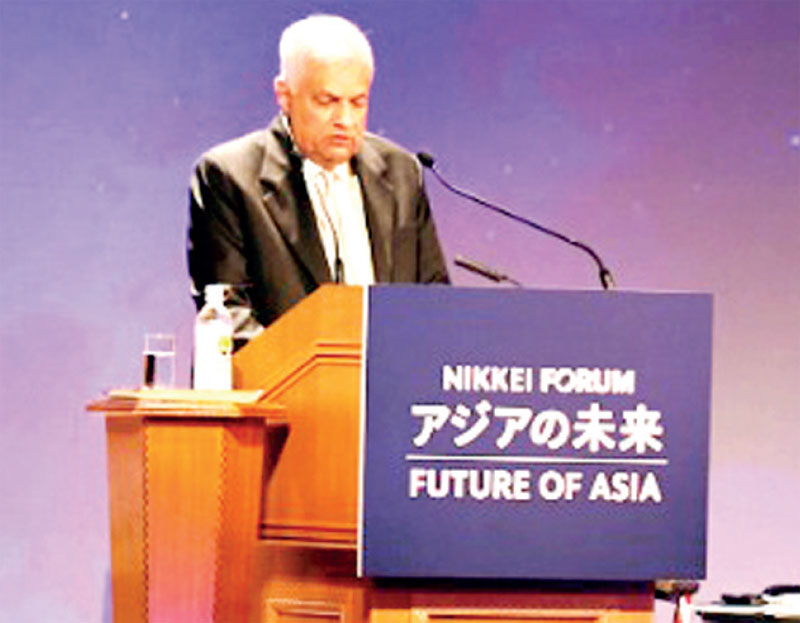Monday Feb 16, 2026
Monday Feb 16, 2026
Friday, 26 May 2023 02:34 - - {{hitsCtrl.values.hits}}

President Ranil Wickremesinghe speaks at Nikkei’s Future of Asia conference in Tokyo on 25 May
Nikkei: Sri Lanka’s President Ranil Wickremesinghe said he intends to apply for membership in the Regional Comprehensive Economic Partnership (RCEP) trade bloc, as his South Asian country strives to rebuild its crisis-hit economy.
Wickremesinghe told Nikkei’s Future of Asia forum on Thursday that Sri Lanka would look to join RCEP “with the aim of achieving a higher level of economic liberalisation.” Sri Lanka had recently mooted the prospect of joining.
RCEP, known as the world’s largest free trade pact, encompasses 15 Asia-Pacific countries covering about 30% of the world’s gross domestic product and population. It includes China and Japan but not the U.S.
The Sri Lankan leader, who took office last year after his predecessor Gotabaya Rajapaksa was ousted in a wave of protests, painted a picture of smaller countries caught between two superpowers.
“The pressure on Asian countries to choose between the U.S. and China is being resisted by many,” he said.
“Many of us cannot make that choice because we have already made our choice,” he said. “We want an Asia that can accommodate” not only the West and allies who call for a free and open Indo-Pacific but also China’s Belt and Road Initiative and proponents of the Association of Southeast Asian Nations Outlook on the Indo-Pacific.
Sri Lanka, he stressed, “is committed to multi-layered connectivity in the Indo-Pacific.”
Wickremesinghe added that he supports Japanese Prime Minister Fumio Kishida’s vision of peace and rules-based prosperity, and that it was based on this that he decided to apply for RCEP membership.
As for Sri Lanka’s financial crisis, which triggered a debt default last year, Wickremesinghe said his nation was “one of the first and worst” affected by the shocks from the COVID-19 pandemic and Russia’s invasion of Ukraine. He was chosen by parliament to replace Rajapaksa amid widespread public frustration over soaring inflation and shortages of daily necessities.
Wickremesinghe said going to the International Monetary Fund for assistance was “the only option available” to Colombo. His government secured a nearly $ 3 billion bailout earlier this year, but continues to negotiate debt restructuring with key creditors including China and Japan.
Earlier on Thursday he met with Kishida in Tokyo, saying the restructuring had made “remarkable headway” and could wrap up later this year.
“Time is of the essence,” he told the Nikkei forum. “We want this exercise [of debt restructuring] to succeed because our experience will enable more middle-income countries [like Sri Lanka] to utilise the IMF in ensuring multilateral coordination for debt relief.”
Recalling the state of the country at the height of the crisis under the Rajapaksa government, he said, “Even if you had money, there was no food.”
He likened the recovery effort to a lifeboat. “It’s like the Titanic, when the ship is sinking and the boat is there. ... So I asked everyone to come in. And everyone to help.”